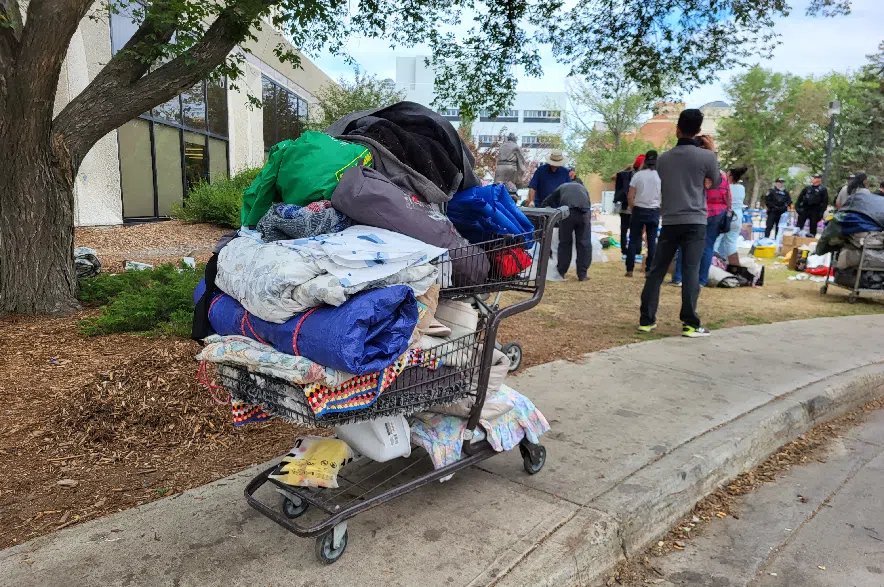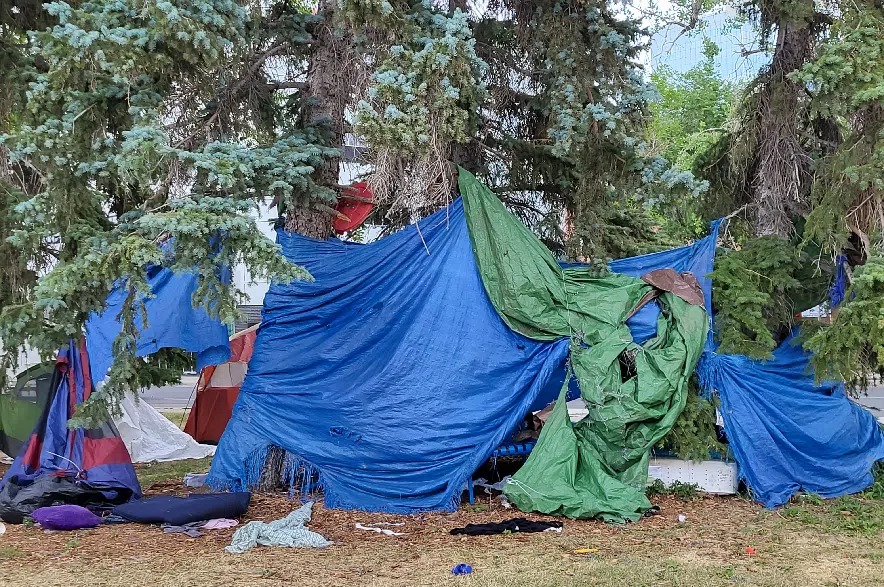The City of Regina is moving forward with a new approach to deal with homeless camps around the city.
The nine recommendations, which all passed, include around $2.5 million in funding to advance the city’s Community Safety and Well-being Plan, Plan to End Homelessness and its Encampment Response Plan. Of that amount, $1,655,000 is to be reallocated from the now-dissolved Community and Social Impact Inc. through the 2026 budget.
Read more:
- Regina council seek ways to reduce mill rate increase ahead of budget talks
- Warming spaces in Regina: provincial funding increased for homelessness strategy
- ‘It costs people lives’: City of Regina declares ‘houselessness crisis’
The city will also receive help from the provincial government in the form of $1.1 million to expand and operate its 24/7 warming spaces for 2026.
Instead of shutting down homeless encampments, the city’s new framework recommends an outreach-based approach that focuses on providing people with the support they need to get housing or shelter.
One of the ideas council directed administration to explore in August was a designated encampment site, which would be overseen by city staff. Administration did not recommend a dedicated site in its report, citing a projected $180,684 monthly cost and concerns about weather, fire risks and staffing.
The recommended approach instead suggests the creation and careful application of a risk matrix to help guide the decisions of city staff when responding to encampments.

The City of Regina will provide $30,000 to the Namerind Housing Corporation non-profit. The city is working with Namerind on its Five-Year Plan to End Homelessness. (Daniel Reech/980 CJME)
“Outside of scenarios deemed unsafe or high-risk, relocating unhoused community members without a support plan and access to appropriate housing options not only jeopardizes their well-being but also perpetuates the cycle of homelessness and encampments,” the report read.
The new encampment response policy will be overseen by an administration co-ordinator.
“I’m going to support the report today, because I think we’re making really important progress,” said Ward 3 Coun. David Froh.
“We’re going to clearly define our role as it relates to housing. People have asked us whether it’s harm reduction or housing. We ourselves, as a council, have asked that. We need to identify not only our role and our strategies, but what success looks like.”
But while he supported the recommendations, Froh noted that the funding will not be enough to adequately solve the Queen City’s issues with homelessness.

According to the Namerind Housing Corporation, homelessness in Regina doubled between 2021 and 2024. (Daniel Reech/980 CJME)
The future of the Regina Street Team
Two former members of the Regina Street Team appeared before council on Wednesday, this time representing a new independent non-profit called Regina Street Team Inc., which is meant to carry on the team’s work.
One was Jason Knudsen, who said the shift into a non-profit was a natural evolution of the work that Street Team was doing.
The organization is currently overseen by the Regina Downtown Business Improvement District, but its future remains up in the air, as the business improvement organization said the size and scope of the team’s services have outgrown its mandate.
City administration laid out options for the Street Team like bringing it directly under the control of the City of Regina or a third party.
Knudsen said it would make more sense for council to fund a different community-based organization that the Street Team could fall under rather than having the city absorb it.
“We recognized early on that our biggest vulnerability has always been being solely reliant on the municipal funding from Regina,” Knudsen said.
“We’ve already made great strides in addressing some of that vulnerability by being able to bring the province on board with some of the things we’re doing, and getting additional funding through them. We believe that becoming a non-profit is the key to unlocking the next level of sustainability for this team.”
Knudsen praised the city’s efforts in aiding harm reduction, but said the bureaucratic nature of government entities like the City of Regina makes it more difficult to quickly respond to on-the-ground issues in the way the Street Team has.
He also said it might be more difficult for the city to build trust among vulnerable community members.
“It’s not to say that the city doesn’t have wonderful people working for them, but it is a government institution and there’s a lot of mistrust with people living rough on the streets when dealing with government institutions,” he said.
“Having us come under the city, it would create a kind of power imbalance that we don’t want to have.”











